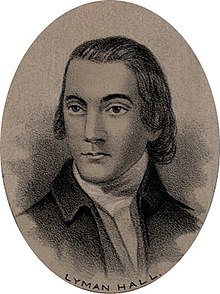Georgia in the American Revolution
However, after the outbreak of hostilities in 1775, radical Patriots (also known as Whigs) gained control of the provincial government, driving many Loyalists out and eventually joining the Second Continental Congress.
Georgia played a key role in the southern theater of the war, serving as a staging ground for Patriot raids into British-controlled Florida in 1776 and 1778.
Brown had come to Georgia with seventy or so indentured servants in November 1774 in answer to Governor Wright's advertisement of the advantages of the newly Ceded Lands above Augusta and founded a settlement called Brownsborough.
After much marching about and some skirmishing around the town of Ninety Six, Brown and his friends heeded South Carolina governor Sir William Campbell's advice to await the arrival of the British.
Brown retreated to East Florida and persuaded its governor, Patrick Tonyn, to allow him to recruit a corps of rangers who would lead Indians to fight on the frontiers in conjunction with the expected landing on the coast.
Though false, the rumors were generally believed, and John Stuart, the Indian Commissioner, fled in fear for his life from Charleston, South Carolina, to Florida.
The Council of Safety, convinced that Savannah was to be the object of a British attack, placed Governor Wright under house arrest and instructed Colonel Lachlan McIntosh to take charge of the defense of the city.
There followed the so-called Battle of the Rice Boats on March 2–3, 1776, when British marines seized rice-laden merchant ships in the Savannah harbor, some of which the militia burned.
[1] In the absence of the governor, the next provincial congress met in Augusta and proceeded to draft a simple framework of government called "Rules and Regulations" that went into effect on May 1, 1776.
George Walton joined Lyman Hall and Button Gwinnett as Georgia delegates to the Philadelphia convention in time to sign the Declaration of Independence on July 4, 1776.
[1] By August, Major General Charles Lee, military commander in the South, allowed himself to be persuaded by Georgians to stage an invasion of British East Florida.
Georgians under Lachlan McIntosh, who was recently promoted to brigadier general, skirmished with the Florida Rangers and their Indian allies on the Satilla River and then abandoned the southern borderlands.
The radical Whigs raised such a cry against McIntosh that Congress transferred him out of Georgia for service under General George Washington at Valley Forge, Pennsylvania.
Howe's regulars managed to drive Lieutenant Colonel Thomas Brown and his East Florida Rangers from Fort Tonyn on the St. Marys River.
Southern governors like Sir James Wright had assured Lord George Germain, the American Secretary in Britain, that hundreds of Loyalists bided their time in the backcountry, waiting for the king's troops.
However, the British Indian allies were badly delayed, and on February 14 several hundred Loyalists were cut off at Kettle Creek in Wilkes County by South Carolinians under Andrew Pickens and Georgians under Elijah Clarke and John Dooly.
[1] With the regaining of military control, elected representative civil government was restored to the Georgia colonial Assembly through the British writs of 1779, and remained as a functioning body until the evacuation of Governor Sir James Wright in 1782.
[1] On July 10, 1779, an ad hoc committee met in Augusta and appointed some of its members to a "Supreme Executive Council," whose purpose was to run the government until January, when a full assembly could meet.
Militia colonel George Wells, who served on the committee that drafted the constitution and acted as Gwinnett's second in the fatal duel, refused to recognize Wereat's council and called for regular elections.
[1] In the most controversial action of his short-lived administration, Governor Walton dispatched a letter to Congress asking for the second removal of General Lachlan McIntosh from Georgia.
McIntosh had returned to the state during the summer to take charge of Georgia's Continental forces, but he resided at the house of a suspected Tory, Andrew McLean.
The Assembly enacted legislation providing for the rapid growth of the backcountry, including a commission government for Augusta, a new town to be named Washington in Wilkes County, and generous land grants for entrepreneurs who would construct ironworks, grist mills, and sawmills.
[1] Encouraged by the British defense of Savannah, General Sir Henry Clinton brought his army down from New York, made Tybee Island his base, and began the siege of Charleston.
[1] More important, Lieutenant Colonel Elijah Clarke came down from his haven in North Carolina, rallied 600 men who had taken a recent oath of allegiance to the king, and attacked Augusta on September 14, 1780.
Though tradition blames Brown for hanging thirteen prisoners, Cruger probably gave the order to carry out the punishment mandated by Cornwallis for those who took up arms after swearing allegiance to the king.
[1] Alarmed by the resurgence of the Whigs under leaders like Clarke, Benjamin Few, and John Twiggs, Brown constructed Fort Cornwallis on the grounds of St. Paul's Church.
The capture of Augusta gave American peace negotiators in Paris reason to demand the independence of Georgia even though Savannah remained in British hands for the ensuing year.
General Greene authorized the creation of 100 horse and 100 foot under the title of the "Georgia State Legion" with Lieutenant Colonel James Jackson in command.
John Twiggs, now raised to the rank of general in the Georgia militia, and Elijah Clarke continued to harass the Cherokee and Creek Indians to insure the possession of land, the great object of the revolution for many Georgians.
The newly independent state of Georgia, though poor in every other respect, claimed a virtual empire of territory reaching to the Mississippi River, which was disputed by the Creek Indians, who actually possessed the land.


